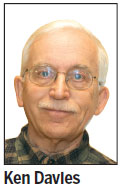Bridging the gap with calm dialogue
Updated: 2014-07-25 04:33
By Ken Davies(HK Edition)
|
|||||||
Opinion on how to nominate the next Chief Executive (CE) candidates of the Hong Kong SAR in 2017 is deeply divided, with much name-calling and emotion clouding the issue. What is now needed is calm dialogue to find common ground so a consensus can develop around a workable, broadly acceptable solution.
The "pan-democrats" cannot ignore Hong Kong's geopolitical location. The SAR is indisputably a part of China. The Basic Law stipulates that the method of selecting the CE must be reported for approval to the Standing Committee of the National People's Congress after endorsement by a two-thirds majority of Hong Kong's Legislative Council and the consent of the current CE. So central government leaders have to be happy with whatever arrangement is produced, or it won't happen.
At the same time, those leaders cannot ignore a poll (even if they view it as being illegal and invalid) in which over a fifth of registered voters showed their wish for the public nomination of candidates. More fundamentally, the fears of a significant proportion of the population of an erosion of freedom and the rule of law need to be honestly addressed - not brushed aside.
If this chasm is not bridged there will be an increased risk of instability. There is ample scope for the "Occupy Central" movement, and maybe other groups, to engage in protests whose outcome is not easy to predict with certainty. So far, the police have shown decency and restraint, but they might find this difficult to maintain should demonstrations escalate and they face increased pressure to contain disruption.

Despite all the vituperation, the various sides actually have much in common. They proclaim allegiance to the Basic Law. (This consensus should not be taken lightly: There are many possible alternative constitutional arrangements.) They, therefore, agree on the principle of universal suffrage, i.e. an election for CE "by secret ballot on a one-person-one-vote basis" (Annex I of the Basic Law). They agree that Hong Kong should maintain its specific advantages, including the rule of law, which also benefits the whole country. Of course, they agree that Hong Kong is part of the People's Republic of China.
Media hype about "Occupy Central" damaging economic growth or about bringing in the army is not helpful. The police are able to contain any demonstration, so there will not be any need for the government to have recourse to Article 14 of the Basic Law under which it may request assistance from the local PLA garrison to maintain public order. (It is more likely to be invoked to help with disaster relief after a particularly bad typhoon.)
Nevertheless, if mutual mistrust and recrimination are allowed to build, it is possible that incidents could occur that make calm discussion more difficult. You have only to look at events in other countries to see how that story could play out.
In this regard, the strategy and tactics of "Occupy Central" look to me to be ill-conceived. The "Occupy Wall Street" movement was a spontaneous expression of anger at the banks following the 2008 economic meltdown. It embodied popular sentiment, but it was amorphous, had no leadership or program, and so was, finally, unable to change anything. Emulating it doesn't make sense. Especially if you announce it over a year in advance so the authorities can mobilize against it. As the Bolsheviks would say: You don't play at revolution.
The democratic camp is itself divided. That should not blind us to the genuine demand for democratic accountability among the general population that they are trying to voice, however imperfectly.
Nor should we overreact to foreign comments. Western countries do not pretend to have perfect democratic political systems, and their systems differ widely from each other. Some have been dictatorships within living memory. That doesn't disqualify them from having opinions.
At the end of the day, there will have to be dialogue leading to compromise. At the two opposite ends of the spectrum we have the best solution, which is a move to dialogue right now, and the worst solution, which is extended contention that paralyses government and threatens unrest until dialogue is only adopted as a last resort.
It does not matter who proposes the dialogue. Several people have done this already, some of them even suggesting what they see as feasible compromises, though these proposals need to be tested in discussion to ensure that all sides can accept them. This is not a bad approach, but it is essential that negotiations be conducted without preconditions. It is up to the government to make the first official move, inviting representatives of diverging positions with a view to finding common ground and, eventually, a solution that will be acceptable to all, i.e. win-win, rather than the result of a zero-sum game.
The author is a Sinologist and was chief economist, Asia, and bureau chief with the Economist Intelligence Unit (EIU) in Hong Kong until 2001, then head of global relations in the OECD's Investment Division until 2010.
(HK Edition 07/25/2014 page9)